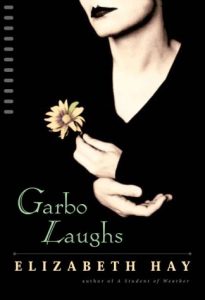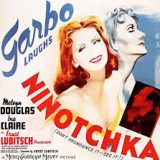Garbo Laughs – Elizabeth Hay – 2003
Reviewed by: Stephen A. Haines Date: 4 March 2004
 Movies have been blamed for social ills ranging from child abuse to revolution. As a pivot of family relationships, however, the movies are rarely a cause. Elizabeth Hay has changed all that in one exquisite stroke. Garbo Laughs is an entertaining and impressive account of a “nuclear family” whose members range from obsessive to indifferent to the enticements of movies. Harriet Browning, a writer, is driven by actors, actresses, directors involved in film.
Movies have been blamed for social ills ranging from child abuse to revolution. As a pivot of family relationships, however, the movies are rarely a cause. Elizabeth Hay has changed all that in one exquisite stroke. Garbo Laughs is an entertaining and impressive account of a “nuclear family” whose members range from obsessive to indifferent to the enticements of movies. Harriet Browning, a writer, is driven by actors, actresses, directors involved in film.
Special effects have little place in her consideration of the films of Cary Grant, Sean Connery and Alfred Hitchcock. Having published her stories to varying reactions, Harriet’s writing has become limited to letters to The New Yorker magazine critic Pauline Kael. Which she never posts.
Harriet’s son Kenny keeps a “gangster’s outfit” available for watching movies and visiting his mother’s friends. He seems to have none of his own. His fascination with movies easily matches that of his mother. He has firm opinions on actors, portrayals, nuances in the making of the videos they watch together. Sister Jane hovers at the edge of the film fanatics, but is still caught up in their debates. Lew Gold, Harriet’s beleaguered husband, withdraws from the film buffs when their intensity surpasses his patience. How far will his disenchantment take him? Perhaps as far as their neighbour “luscious Dinah Bloom”?
Harriet’s relations with Dinah, as well as with her other neighbours, keeps in delicate balance throughout the story. Harriet’s writing and film watching have become the focus of a life easily intruded upon. The greatest intrusion comes in the form of her aunt Leah and that widower’s stepson Jack. Leah, a badly disguised character in Harriet’s book, arrives for visit – one likely to be extended. She harbours resentment over the book, a feeling built on previous bumpy relations with Harriet. It’s a contest of wills, Leah’s overbearing manner only slightly modified by being on Harriet’s turf. Hay portrays these persona with wit and skill. None are false nor overdrawn. They seem to have taken over the story with Hay simply recording events. Perusing her portrayal of the people and events draws the reader into intimate association with them all.
Hay’s writing skill borders on a prose version of Mozart. Like his sonatas, her words are carefully chosen and placed. None are out of order. There are no lapses to leave the reader wondering what she meant. Every sentence has a place in the story leading the reader confidently along the narrative. This isn’t cold, clinical precision. Her character building is dynamic – they are alive, bickering, plotting, evaluating. Stillness isn’t part of the story, even when the character is alone. In Ottawa, with river, canal, parks and spreads of forest, solitude should come easy. In Hay’s hands, this little city is fraught with local intensities.
Hay is fascinated with weather. Who can blame her, living in Ottawa? Having previously examined Saskatchewan drought and New York humidity, she strives here to impart the chaos of the Great Ice Storm of 1998. She captures the permanent bending of trees, the treacherous sidewalks, the quiet dictated by impassable streets, with vivid eloquence. If you weren’t there, trust in how skillfully she imparts the daily experiences and long-term effects. She shows how lasting such an event can be on lives. Recovery is hesitant, unpredictable and presenting fresh difficulties. Hay weaves all this in to a poignant finale, all the threads coming together effortlessly. A brilliant book, worthy of attention.















